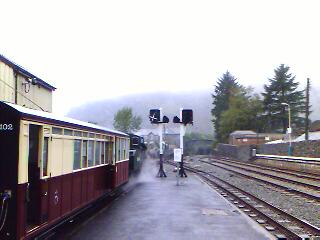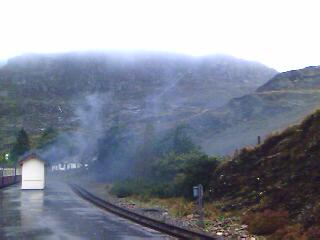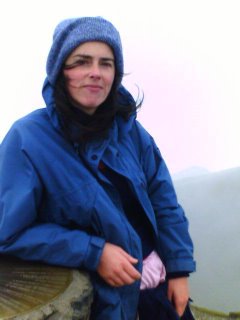In a post a couple of days ago I wrote about forgetting. How I want to keep remembering the bigness that I chose to forget the day my shoes became to small for my changing feet and the taxman came a calling.
Maybe this is just a process that happens over time, a gradual erosion of innocence in the mind, as experience rakes us over the coals and we become 'adult'. But I can also see how it can just take one or a few single experiences to do this to us, where life can never then be the same again and it feels like there is no going back.
You can never go home again.The dream is lost, the love is betrayed, the dog gets run over, the parent leaves, the child is never born, the talent goes unrecognised. Even the seemingly tiniest of things can change us irrevocably - that harsh joke at your expense from an otherwise all loving grandparent, that schoolyard taunt that never went away, the way he held you that one time and it made you feel all dirty and bad.
And yet on and on we go, forgetting because we don't want to remember it, the bad things, those embarrassing moments, the shame of the past, and how our innocence and naivety led us, again and again, into trouble and pain.
But if we ever stop to think of such moments, where everything got changed, where we made a decision somewhere to close down, or run away or be tough or never let anyone near again, we'd realise how often they'd been made in an instant, and a moment of intense or sometimes not so intense disillusion and betrayal has marked our future forever.
But we can open up the vaults and let the past through. We can sit in the complexity of our selves and let them be. If we can just give them space. Let the hordes through, let them rampage our streets and tear up our neat new lawns. And then let them leave, wave them off, show them the door - after all, you don't want to be stuck with that death metal listening teenager forever.
But I wonder, I wonder about what happened before even all the trials and terrors of childhood and adolescence, of birth even.
What about before life even came?
When I see pictures or footage of Antartica, I feel a sense of that, of the wilderness that was before life came. Before there was language and a civilisation of the senses. When I look at the blueness of glaciers, the whiteness of ice, the stillness of freezing water, I have some sense of what it means to be unborn. What it means to be deathless. Such landscapes are the gateway into a state that lives in the human psyche and beyond it. I recognise it when I see it and I say:
there I am, there it is, this is it.
Nature mimics the mind, or is the mind. But my mind has forgotten itself, it has forgotten what it is, it has (necessarily) left behind its true identity, in search of Life and Order and the World. Because that is the way of things, that is the nature of living. And once you are born, it may fill you with awe to stare upon a glacial wilderness, but it is also terrifying, because it is all whiteness, it is ferociously uninhabitable.
And the only animals alive in these places seem like creatures from a childrens' story book, fantastical, hilarious, unearthly, zoomed straight from the unconscious into a billowing white pillow of nothingness.
The vast and uncivilised places will always have answers to the questions we seek or run from, will know more than we can ever hope to, with our silly clever minds, with our hard hats and our compasses. They are always beyond our reach.
I remember feeling this way as I looked across the Almerian desert last year, as I felt it all around me, amidst its stark branches and crystal rocks, a bigness I could not comprehend, but felt, that knew me better than I knew myself. It was eerie.
There is a place in the desert, perhaps the Sahara, where, for the time you stand there, all your memory of who you are and what your past was is erased. And there is only that moment. Apparently it is deeply unsettling, disturbing, and one who has stood there can never be the same again.
I don't know how true this is, but of course my first reaction to hearing it was "I want to go there". To a place beyond the reaches of the mind. And partly I do, partly I want it so bad that when I
do see footage of wild places, such as Antartica and the desert, I am immediately in tears. Because it reminds me, of something I know but I have forgotten, somehow chosen to forget. And it grieves me - remembering a little more of who I am reminds me of how much I forget it most of the time.
And so also, I do not want to go to some place that wipes your memory, and maybe replaces it with a truer one. Where there is perfect recall. Because it is frightening. So I look at pictures instead, and dream of a day when I will set foot on the ice, of when I will let the sands take me.
But, as it is in the tiniest moments that we can forget who we really are, it is also in them that we can remember. I have been to dramatic places, literally and symbolically, that have changed me irrevocably. And yet also I have seen a picture or heard a sound or song which, in one moment has changed my life forever. We do not have to cross ten thousand miles to find what we are looking for.
But somewhere I want to. More and more I identify with the myth of the explorer, of the expedition, the journey to the centre of the earth. I want to pilgrimage. I want to cross the seas for no other reason than because my heart is moved to. I want to do it alone. I want to do it with others. I want to discover uncharted territory and bring back treasures. I want to live out with my arms and legs the poetry that brims in the corner of my eye.
My Grandpa and Great Uncles were Captains of ships throughout this century, and some of them died at sea. I like to feel I have adventure in my blood. Or maybe I've done enough travelling inside myself, I want the world too. I want it all in my arms like a greedy girl, with its red stained seas, its whitewash walls and frozen waterfalls. With its flippers and its mites, its dungheaps and its leopard's kill. The end of the road. The mouth of the river. The trail of dust.
And dreams are beautiful, messed up things. After all, they're what brought us out of the womb in the first place: and it is this beautiful hunger that makes us seek, and search, and want to live, and fall in love, and that desires it all and desires none of it, that is foolishly, heroically, doomed. It is what makes us both forget and remember, seek out the best and the worst and tie them both together in the strangest kind of knot. It is what makes us run away like cowards and stay and fight, right to the end.
And I can't help that naive, sometimes grandiose, romantic streak, that engulfing passion that sometimes swallows me up whole.
Beautiful, doomed creatures we are. Like penguins on the ice, we risk our lives every year to take the journey to the breeding ground, to find the mate, hatch the egg, and, if we are lucky, and still alive,
see the baby born.


